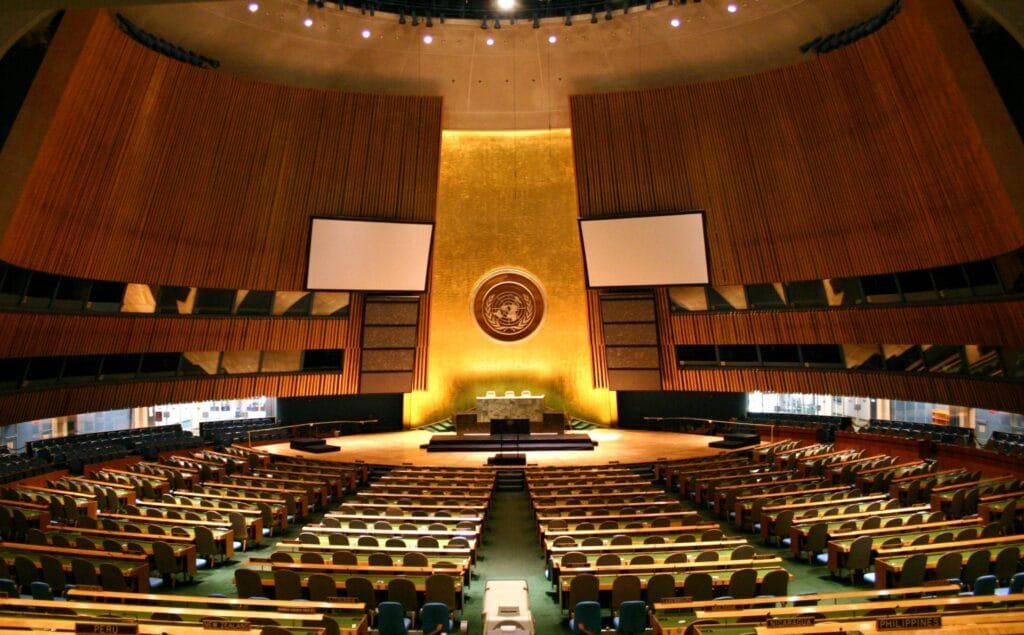How disagreements over Russia’s nuclear threats could derail the NPT Review Conference
By Jamie Kwong | July 1, 2022
 United Nations General Assembly hall at the UN Headquarters, New York City (Image Patrick Gruban, CC BY-SA 2.0)
United Nations General Assembly hall at the UN Headquarters, New York City (Image Patrick Gruban, CC BY-SA 2.0)
Members of the Treaty on the Prohibition of Nuclear Weapons (TPNW), also known as the ban treaty, met June 21-23 in Vienna for the treaty’s first meeting of states parties. As the first formal gathering since the treaty entered into force in 2021, the meeting set the course for implementing the treaty’s bans on nuclear weapons and related activities and its positive obligations on victim assistance and environmental remediation. The meeting also shed light on what to expect at the second, highly anticipated nuclear meeting of the summer: the Nuclear Non-Proliferation Treaty (NPT) Review Conference.
For context, the ban treaty is intimately linked to the NPT—although supporters and opponents of the TPNW disagree on exactly how. Critics of the ban treaty—which include nuclear-armed states recognized by the NPT and their allies—contend that the treaty is an unrealistic approach to disarmament that threatens to disrupt the NPT, the cornerstone of the global disarmament and nonproliferation regime. Members of the ban treaty instead argue that the treaty complements the NPT and provides practical mechanisms for implementing the NPT’s commitment to disarmament—and reaffirmed as much in Vienna.
Perhaps their surest link, both treaties have designated Summer 2022 as an auspicious meeting time. NPT members will gather in New York City in August for the treaty’s 10th Review Conference to identify and address challenges facing the treaty and its larger regime.
Last week’s ban treaty meeting provides useful insight into what issues might be most pressing—and simultaneously presents its own challenges. NPT members can anticipate contention around Russia’s war on Ukraine, disagreement on how to address the Vienna meeting in New York, and continued divides over the NPT’s disarmament remit.
Russia’s nuclear rhetoric. Many ban treaty members condemned Russia’s war on Ukraine and “its accompanying nuclear threats and rhetoric” in Vienna. Others, however, did not. This disparity became the meeting’s main point of contention. Importantly, the meeting’s declaration broadly condemns “unequivocally any and all nuclear threats, whether they be explicit or implicit and irrespective of the circumstances.” But it stops short of calling out Russia for its invasion of an NPT-compliant, non-nuclear weapon state and its dangerous nuclear rhetoric.
That member states of a treaty that prohibits nuclear threats could not agree to explicitly denounce Russia’s actions suggests a contentious way ahead for the NPT Review Conference. Russia is, after all, one of the five nuclear weapon states recognized by the NPT. Some states are likely to emphatically condemn Russia’s nuclear rhetoric. Already, many—including the United States and its European allies—have argued that Russia’s actions pose significant challenges to the NPT, with serious implications for both disarmament and nonproliferation. Russia’s invasion could also undermine the joint commitments made by the five nuclear weapon states in late 2021 and early 2022 to advance strategic risk reduction as well as to prevent nuclear war and arms races.
Russia, on the other hand, is likely to push back and find support—or at least a lack of criticism—from some states with continued economic or ideological ties to Moscow. This contention could feasibly dominate atmospherics at the NPT Review Conference and prevent any substantive outcomes.
Acknowledging Vienna in New York. The first meeting of states parties in Vienna garnered momentum for the ban treaty. Days before the meeting, three states—Cabo Verde, Grenada, and Timor-Leste—ratified the treaty, and Malawi followed suit a week later. Still more states plan to do so in the weeks to come. High-level participation at the meeting—from Fiji’s Prime Minister to several foreign ministers and deputies—sent a strong political signal about the members’ commitment to implementing the treaty. And unanimous agreement on a political declaration and action plan suggests such momentum will continue ahead of the next meeting in late 2023.
Building on that momentum, TPNW members will likely press for recognition of the treaty and Vienna meeting outcomes at the NPT Review Conference. Member states will want to celebrate their efforts to initiate a measured way forward for the treaty—and for executing the NPT’s commitment to disarmament. Meanwhile, opponents of the treaty will likely reiterate their concerns, noting especially that the meeting did not resolve concerns about the treaty’s verification mechanisms. Remarks by Germany, the Netherlands, and Norway in Vienna—all NATO states that participated as observers in the meeting—suggest opponents are also likely to critique the meeting’s outcomes for excluding language on concluding IAEA comprehensive safeguards and Additional Protocol agreements.
In its remarks, Norway presented perhaps a mutually acceptable way forward: stick to the basics. Its delegate stated, “[w]e acknowledge the TPNW has entered into force, and we recognize that 86 countries have signed it.” Such a factual acknowledgment of the ban treaty could serve as suitable language for an NPT outcome document in New York.
Outstanding divides. TPNW members made key decisions in Vienna to move the ban treaty forward. The meeting participants adopted deadlines for the destruction and removal of nuclear weapons by future members, established working groups to advance key provisions of the treaty, and agreed to set up a scientific advisory group to ground the treaty’s implementation in scientific and technical advice.
However, states did not designate a competent international authority for verifying the complete and irreversible dismantlement of a state’s nuclear weapons program. To be clear, they did not have a treaty-bound mandate to do so at the first meeting. But, as skeptics have pointed to concerns about the ban treaty’s verification mechanisms, not designating an authority means key questions about the treaty’s implementation remain unanswered. Such continued tension between TPNW supporters and opponents captures a larger challenge facing the Review Conference: a fundamental divide between NPT member states over prioritizing the treaty’s disarmament remit.
While ban treaty supporters and many other non-nuclear weapon states are frustrated by the lack of progress toward disarmament, nuclear states and their allies argue the geopolitical security environment precludes significant disarmament progress. This divide is fraying the NPT regime. Russia’s war in Ukraine has only deepened the divide, with the ban treaty supporters arguing the war has demonstrated the unacceptable dangers of nuclear deterrence and opponents arguing it has highlighted the importance of strengthening deterrence. Russia’s invasion of Ukraine has also raised fundamental questions about reducing the risk of nuclear use, an area of common interest across the disarmament divide. Are current risk-reduction tools that are designed to prevent misperception and inadvertent escalation sufficient to tackle intentional escalation and risk-taking by a nuclear weapon state?
Delegates traveling to New York in August will have a hard time finding solutions to these challenges. But their task will be made easier if they put aside their differences and work in good faith toward an outcome that not only reaffirms the importance of the NPT but offers concrete steps toward its future success. Now more than ever, states must work together in pursuit of a common goal: restoring, safeguarding, and advancing the disarmament and nonproliferation regime.
Together, we make the world safer.
The Bulletin elevates expert voices above the noise. But as an independent nonprofit organization, our operations depend on the support of readers like you. Help us continue to deliver quality journalism that holds leaders accountable. Your support of our work at any level is important. In return, we promise our coverage will be understandable, influential, vigilant, solution-oriented, and fair-minded. Together we can make a difference.















